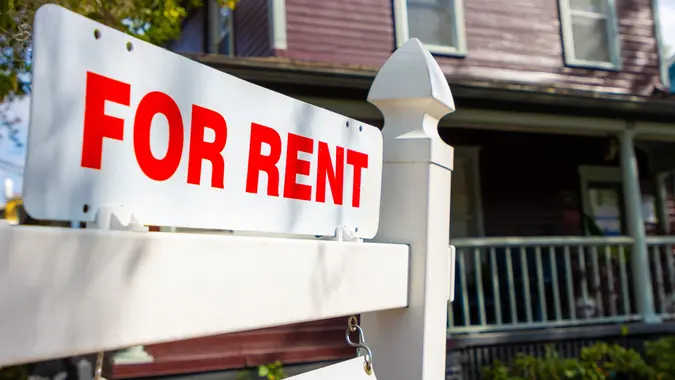5 Reasons Rent Can Be an Investment

Commitment to Our Readers
GOBankingRates' editorial team is committed to bringing you unbiased reviews and information. We use data-driven methodologies to evaluate financial products and services - our reviews and ratings are not influenced by advertisers. You can read more about our editorial guidelines and our products and services review methodology.

20 Years
Helping You Live Richer

Reviewed
by Experts

Trusted by
Millions of Readers
Rent being an investment might feel crazy to you if you’ve heard your whole life that you need to buy a home as part of the American Dream. You’ve been told that owning a home is an investment and that renting is like throwing money in a hole in the ground.
But there are ways rent can actually be an investment.
Lower Upfront Costs
There are a lot of expenses that come with buying a house. For example, you’ll need a down payment and money for closing costs. These upfront expenses can cost tens of thousands of dollars, if not well into the six figures.
When you rent, you’ll typically pay the first month’s rent, last month’s rent and maybe a deposit equal to a month’s rent. That deposit is almost always just a couple of thousand dollars.
“Home buying transactions aren’t friction free, realtor costs, maintenance, moving expenses etc. all mean that there may be a breakeven point of a couple years before which renting comes out ahead,” according to Zach Ashburn, CFP, at Reach Strategic Wealth.
With the money you may save, you can invest in the market and grow it to even greater heights. According to Business Insider, the S&P 500 has seen average annual returns of 10.5% since 1957.
No Maintenance or Repair Costs
What happens if your toilet breaks in a home you own? How about if your house floods? Or you have to get new roofing? Maybe a sewage line breaks or the water heater is busted. In most cases as a homeowner, you’ll have to pay for the repairs.
“I always say, ‘The only people who think renting can’t be an investment, are people who’ve never had water in their basement,'” Ashburn said.
And, of course, homeowners also have to pay for regular maintenance, like cleaning gutters, cutting branches on trees, having an HVAC system cleaned and more. Home maintenance costs such as these can run over $10,000 per year for the average American, as reported by Forbes.
With renting, a landlord typically covers all of that, just be sure to double-check your lease agreement. If anything goes wrong, you likely can make a call, and they’ll take care of it.
You can put all that money you would have spent in the market and potentially make great returns.
Tax Advantages
You probably already know about the tax advantage of owning a home. Per the IRS, homeowners can write off the interest they pay on their mortgage up to a certain amount. But there are also disadvantages. Homeowners have to pay property taxes, which can amount to thousands of dollars each year.
When you rent, you won’t pay any property taxes; you pay only the rent due every month. You can also often get a renter’s tax credit in many states. That means you could be making money.
Access to Amenities
If you find the right apartment or condominium complex to rent from, you can often find many amenities. Included in your rent might be a playground, a pool, a community room with movie nights, a gym, a spa and so much more. Things like a pool in a home could be super expensive to install and take care of.
“If renting provides the convenience of using a maintenance team for repairs or access to amenities such as a community room, gym or pool that could be the perfect fit for someone. Even though traditional thinking would say there is no long term gain from renting, if you factor in the cost (and anxiety that comes from decision fatigue) to replicate the amenities through homeownership, it may be a better investment to rent,” said Katie Stych, financial coach at Your Watershed Moment and former financial advisor.
Cheaper Insurance
Finally, renters insurance is often a drop in the bucket compared with homeowners insurance. Homeowners insurance, especially if you live in an area prone to natural disasters, can run up to hundreds of dollars each month. The average cost of renters insurance, according to Business Insider, is just under $15 a month.
It makes sense. If you’re renting, you have to protect the few items in your apartment or house. If you own property, you need to cover all the land, structures and everything inside.
Ultimately, renting can be a good investment, as it can allow you to save money and put it to work elsewhere to achieve your financial goals. “In all honesty, rich people understand something most miss: sometimes not tying up capital in property creates more wealth than ownership ever could. The real value isn’t in owning the house, it’s in controlling where your money works hardest. Sometimes paying rent actually makes you richer than paying a mortgage,” said Luke Patterson, senior mortgage broker at Koalify.
More From GOBankingRates
Sources
- Zach Ashburn, Reach Strategic Wealth
- Business Insider, “Average Stock Market Return: A Historical Perspective and Future Outlook.”
- Forbes, “Home Maintenance Costs Can Now Exceed $10,000 A Year.”
- IRS, “Publication 936 (2024), Home Mortgage Interest Deduction.”
- Katie Stych, Your Watershed Moment
- Business Insider, “Average Cost of Renters Insurance (HO-4) in 2025.”
- Luke Patterson, Koalify
 Written by
Written by  Edited by
Edited by 

























